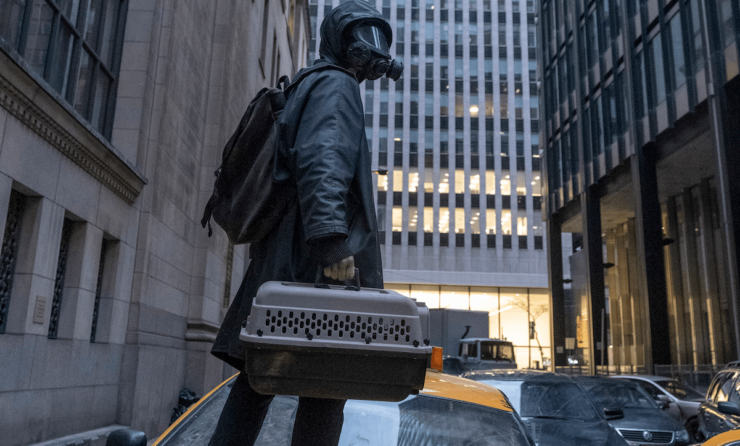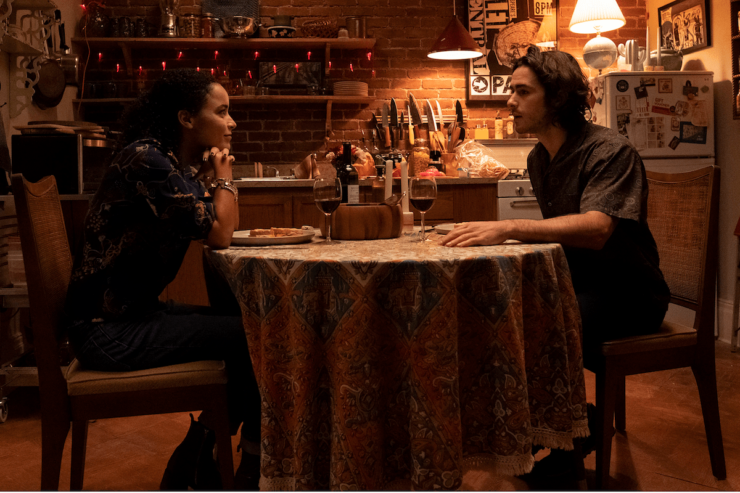As a fan of Brian K. Vaughan and Pia Guerra’s Y: The Last Man comic book series, I understand why the TV adaptation chose to keep the very sci-fi title for brand recognition. Yet I can also acknowledge that it’s become something of a misnomer for the new series, which transforms the source material’s gender binary-dependent premise into a more nuanced take on gender and masculinity in a world without the Y chromosome. Whether it will succeed in this new aim and keep the propulsive force of the comic is yet to be seen; the first three episodes are a shockingly slow start, with the action and intrigue only really ramping up in the final moments.
Spoilers for the first three episodes of Y: The Last Man.
Fans of the comic will find impressive interpretations of characters such as Agent 355 and Hero Brown, with the TV series adjusting or expanding their plotlines to intriguing effect. Yorick Brown, the last cisgender man, is an unintentional enigma in that it’s unclear how much he will command the story like his comic forebear. Three episodes in, Y is still struggling to differentiate its post-apocalypse from the many others we’ve seen in TV and film lately—though it makes the keen choice to replace the gender binary with a very familiar political binary, examining a sudden world-altering event through 2021’s conspiracy theory filter. It’s not the strongest first impression, but there’s clearly ambition and considerate effort to update a story for a broader audience, both in terms of new viewers and those who might have felt alienated by the original.
Normally the series will be releasing one episode per week, but FX on Hulu premiered the first three at once. Even though they operate more as serialized chapters than episodic standalones, we’ll examine them one by one.
Summary
“The Day Before”
Mimicking the first issue of the comic book series, the Y pilot takes place in the before times—that is, introducing us to each of the main players as they were in their lives, existing comfortably (or not) before half the planet is snuffed out. Technically the episode starts out in media res, showing the XY human and animal carnage across settings both rural and urban, focusing on a gas-masked Yorick chasing his monkey Ampersand through corpse-ridden New York City. But these are just quick teasers of the comic’s iconic imagery for the diehard fans. Back to before!
Yorick Brown (Ben Schnetzer) is an aspiring escape artist who scrapes together rent money for his way-too-nice apartment by teaching magic tricks to rich New Yorkers’ kids—or, when his inability to get out of a straitjacket loses him even that gig, he relies on his parents and sister for financial support. He’s also training a helper monkey, a grumpy capuchin named Ampersand. The boy’s priorities are a little out of whack: He begs his hot mess older sister Hero for a hundred bucks to buy wine and cheese… so that he can propose to his girlfriend Beth Deville (Juliana Canfield) before she leaves for her fellowship in Australia. Unfortunately, their romantic fancy-grilled-cheese dinner tips over into a potential breakup when Beth panics about how he’ll resent her while she’s away and be holding her back from meeting new people (ouch). She leaves the apartment, which means they’re apart once the shit hits the fan.
A study in contrasts, problem child Hero Brown (Olivia Thirlby) is an EMT who’s currently attending AA sessions for a DUI with her best friend (described in the press notes as “enabler”) Sam Jordan (Elliot Fletcher). She drives an ambulance saving people’s lives… when she’s not using the back to hook up with her married fellow paramedic Mike (Daniel di Tomasso). He tells her he’s left his wife, but when she glances at his phone she discovers that he hasn’t actually told her about the affair, and that as far as the wife has concerned, he’s still a faithful husband and father to their newborn daughter. In a rage, Hero throws various objects at Mike—including an oxygen tank, which fatally clips him in the carotid, causing him to bleed out in her arms.
Over in Washington, DC, Democratic Representative Jennifer Brown (Diane Lane) is a bit too busy pondering her presidential run in two and a half years to pay much attention to her floundering kids. She pays Yorick’s rent without hesitation, and she and Hero seem mutually estranged even if they won’t refer to it as such. Not to mention, she and her husband, Shakespeare Professor Brown (Sam Prideaux Robards) are in the early stages of a divorce despite the fact that she’s asking him to stay after he presumably cheated on her. Across the political divide, Republican President Ted Campbell (Paul Gross) disagrees with Jennifer’s calling-out of internet hate speech and linking it to terrorism; he would rather advocate for unity and both-sides-ism, so she calls him a misogynist in the press. While he and Jennifer might have once been friends, they won’t be again until the next election.
First Daughter Kimberly Campbell Cunningham (Amber Tamblyn) acts like a pseudo-member of her father’s Cabinet, when she’s not promoting her books against cancel culture and pro her identity as a “boy mom” to three undisciplined kids. Among the women the President actually employs is Nora Brady (Marin Ireland), who conversely doesn’t get enough credit for the work she does as the President’s press advisor. Though she’s in her element when grilling Jennifer on publicly criticizing POTUS, Nora gets shy when the President pulls her into a photo op shooting guns—that, or she’s got a past with firearms that she would rather not draw attention to. Despite her workplace frustrations with not being taken seriously enough, at home she’s clearly head of the household, corralling her husband, preteen daughter, and young son.
Halfway across the country in Skiatook, Oklahoma, Culper Ring Agent 355 (Ashley Romans) is deep undercover as a domestic terrorist’s bomb-maker savant girlfriend, only to set off her creation and kill both sides engaging in the deal. Casually jogging away from the explosion, she is picked up by her handler/mentor, Agent 1033 (Milton Barnes) and given a new assignment: She’ll be a Secret Service agent named Sarah Burgin, as she is needed in DC, stat—there’s “a credible threat” around POTUS, and the Culper Ring wants someone embedded in his office.
All the while, animals across the country are starting to exhibit suspicious behavior: 355 catches sight of a buck dead of eye/ear hemorrhaging; a runaway police horse and sewer rats going berserk interrupt an aide’s date; the last thing Mike sees before he dies is a poor dog bleeding from his mouth. The XY deaths seem to be happening in waves, until it hits humanity all at once.
The episode ends just like the first issue, with a brutal montage of cisgender men dying in front of us or their bodies being discovered. (We’ll delve more into this narrative choice in the commentary.) 355’s first day shadowing the President is an eventful one, as the man of the hour spews blood all over the war room before collapsing dead, with his cis male colleagues following like dominoes. With the cis female staff going into shock, Jennifer and 355 launch into action to hustle everyone to a safer location, as if such a thing exists. A catatonic Hero waits for the police officer approaching her ambulance to arrest her, but he dies before he can see what she’s done. Lurching out onto the streets of Manhattan, she witnesses the car accidents and general mayhem of strangers dying around her. At home, Nora goes to wake up her husband and son, who had crawled into bed with them the night before, and it’s as awful as you can imagine. The pilot ends with Yorick (and Amp) waking up to this new world.
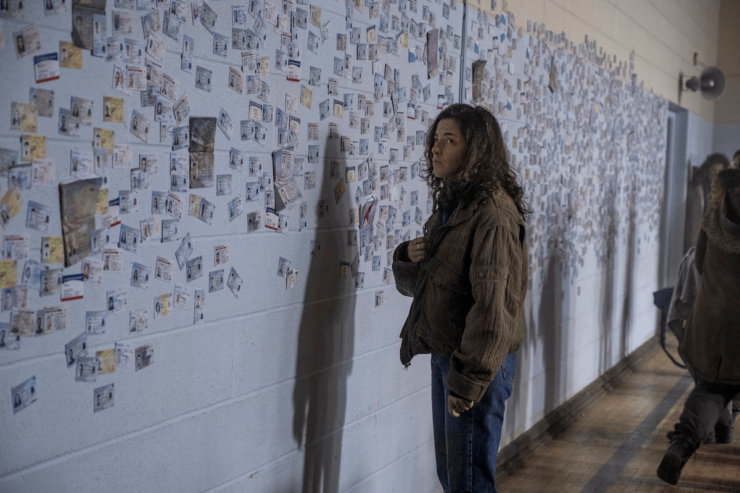
“Would the World Be Kind”
Eight days after the Event, President Jennifer Brown and her skeleton crew are losing the White House to grieving, angry, scared protesters; they’re already holed up in a secure location (the Pentagon?) so they decide to give up the symbolic building. What’s more concerning on a national level is the power plants shutting down and with them, the electricity. Right behind that—and especially dire for Jen—is the need to evacuate New York City, as the buildup of water-borne diseases (caused by bodies left in stagnant water in the subways) will threaten the city’s remaining inhabitants. By the time we flash-forward to two months later and counting, tanks patrol the streets, spewing out flyers urging people to leave while they still can.
Meanwhile, Agent 355’s first move after the Event (after turning on a Culper Ring distress beacon the moment it happened) was to travel to the Culper Ring’s rendezvous point/headquarters, a package company called MailboxFox in some indeterminate snowy town. But all she finds is 1033’s body, and despite sending out emergency broadcasts to the Ring’s other bases in various cities, she seems to be alone. Returning to DC, she reveals the existence of the Culper Ring to Jennifer and basically places herself in her hands—after all, she was sent to DC to serve the President.
A bereft Kimberly struggles to find purpose with the only family member left being her mother Marla Campbell (Paris Jefferson), the former First Lady having gone slightly mad. Meanwhile, Nora is among the mob rushing the barricades, desperately claiming that she’s needed by the administration. But the unsympathetic guard calls her “nonessential personnel,” pointing out that if they had needed her, they would have sent for her weeks ago. Inside the president’s hideout, despite Kim’s efforts to get an audience with Jennifer, the older woman brushes her off and keeps her plans close to the vest—namely, sending 355 after Hero.
However, Hero is unwilling to use the connection to her mother, the first female president, to get safely out of NYC. She and Sam have linked up with a group of trans men, pooling their scavenged finds including vials of testosterone and other resources necessary for survival. Sam begs Hero to ask Jennifer for help, sobriety be damned, or else their only option is to leave town with their fellow survivors. But Hero’s insistence on returning to a soon-to-be-shut-down FEMA shelter for women searching for the bodies of their lost loved ones costs them the ability to stay with their group. The others leave Sam behind with only two weeks of T; he and Hero are all each other has. The only thing that matters to a guilt-stricken Hero is that she returned Mike’s drivers license to his grieving widow, revealing her connection to him by doing so.
Back in his iconic gas mask, Yorick searches for Beth but can’t find her. When Amp runs into the subway, Yorick follows him into the rising floodwaters contaminated with bodies, getting nothing but drenched for his trouble. When he tries to steal some clothes from a dry cleaner, the Chinese family who owns the business threaten to trade him in for a reward at gunpoint, despite his pleas for them to leave the city before they get abandoned. It’s only when he goes into a full-blown panic attack that they take pity on him and let him go.
An exhausted Yorick camps out in Hero’s uninhabited apartment, which is where a shocked 355 finds the last surviving cis man and his monkey. But it’s not just her: The two helicopter pilots who transport him to DC, and witness his tearful reunion with his mother, are now among the handful of people who know about his existence.
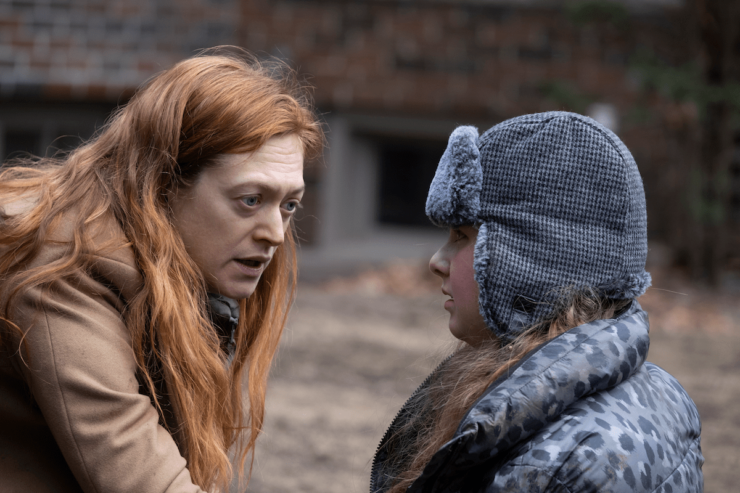
“Neil”
Immediately the conspiracy theories start among the two pilots: What are the odds that the new president’s son just happens to be the only cis male they’ve heard of who has survived? 355 tries to manage their suspicions, at first by dismissing them as anything but sheer randomness, and later by bribing the two with Medals of Honor. But while she’s forcing the pilots to stay locked in a room, Yorick is chasing Ampersand around the building where the former and current presidential families are both living—which means that Marla almost catches sight of him before 355 and Jennifer convince her that she’s seeing ghosts.
Yorick is rattled by the wall of photos of men they’ve lost—which includes his college graduation photo—as it only amplifies his conviction that he should not have been saved. He and Jennifer discuss how Yorick is not the last man on Earth; they’ve identified plenty of trans men who survived the Event. However, Yorick is the only human with an XY chromosome who seems to have survived. While Yorick is eager to track down Beth, who he thinks fled to Ohio to take care of her mom during her cancer treatment, Jennifer orders him to first find Dr. Allison Mann, a renowned (and unorthodox) geneticist who is the best possible person to discover what saved Yorick and Ampersand.
While the chain of command did initially identify Jennifer as the next surviving successor to the presidency, she mentions that there was another woman ahead of her in line: Regina Oliver, “anti-immigrant, anti-government, anti-vaxxer with a Twitter following,” but she had supposedly died overseas. Lo and behold, who wakes up in an army hospital in Tel Aviv but Regina Oliver (Jennifer Wigmore), whose existence somehow makes it back to the States. Kim—having traded a cashmere shawl for some cheap blonde hair dye to feel like herself again—corrals the other Republican widows and other former administration members who feel shut out by President Brown’s new coterie, and they have a confrontation in the hallway. Yet Jennifer quickly shuts down their accusations about knowing that Regina was alive, even as privately she discusses with her ersatz Cabinet that there is no way they can hand the presidency over to someone who is pro-guns (and anti-all the above) and who wasn’t here for the past several weeks.
In the suburbs, Nora has to return to her fellow neighborhood moms with the humiliating news that she couldn’t get through and therefore has nothing to offer their makeshift band of survivors who are already without power and dwindling food and water supplies. Indeed, the other moms have already been planning on leaving with another, but they have only enough room for themselves and their kids—she’s nonessential personnel to them as well. Nora and her preteen daughter Mackenzie Brady (Quincy Kirkwood) prepare to strike out on their own, but Mackenzie is anxious about leaving the bodies of her father and brother there for birds to pick at. When Nora’s struggles to dig a grave in the backyard bring her face-to-beak with a nasty-looking vulture, she gives up on giving them a proper burial and shuttles Mackenzie into the car. With Dolly Parton singing “After the Gold Rush,” they leave their men behind and head toward their future, wherever it will be.
In front of the wall of men they’ve lost, Kimberly asserts her personal knowledge of all the White House staff—including episode namesake, “Treasury Nell”—over Jennifer and lets drop how curious it is that her mother saw Yorick, of all people, when she was supposedly hallucinating. (Yes, I’ve listened multiple times and it sounds like they’re talking about a woman named Nell, despite the episode’s title being a male name.)
Jennifer may not be good at remembering who Nell/Neil was, but she’s stellar at convincing Sharon Jacobs, nuclear engineer and grieving mother, to return to the nuclear plant she left and get things back online.
The two helicopter pilots are released with the very important, very secret mission to transport Yorick to Boston to find Dr. Mann. But 355 puts herself and Yorick in a second copter, supposedly flying cover for the first… and instead witness the first chopper going down in flames. Was it sheer randomness, or was it sabotage? Is the last man flying with his protector, or with someone who wants him dead? Tune in next week to find out!
Commentary
The worst thing I can say about this adaptation of Y: The Last Man is that visually and atmospherically so far it feels like a generic apocalypse. For all that the comic book series relied heavily on gender binaries, it made very specific, deliberate, committed choices about how the remaining cis women reacted to losing all the cis men: There were immediately one-breasted Amazons, gun-toting Republican widows, Alter and the IDF bearing down within a few days; two months later—a new world order was easily established. By contrast, the first sixty-odd days after the Event are still very reactive and more resemble the pre-Gilead (but post-America) flashbacks in The Handmaid’s Tale: women hunkering down without power, suspicious of the government, eyeing one another to figure out who are allies and who are foes. As Caroline Darya Framke wrote in her Variety review, the show “takes itself too seriously to allow for many other emotions beyond ‘desperate’ and ‘grieving.'”
That’s not to say there’s not deliberate choice here, but it’s mostly centered on conspiracy theories—which, honestly, is probably the strongest way to go considering the context in which this adaptation was made. The comic laid out all of its major players in the first issue, establishing conflicts on a global scale; by contrast, the TV series is starting with a tight focus on the United States, centered in NYC and Washington, DC. In a present that branched off from our own somewhere around the Trump administration and before Covid, yet with the same societal issues, it makes perfect sense that Americans’ first reaction to a post-XY apocalypse would be to assume that there is a massive conspiracy at play. And it’s not just here—Russia’s failed attempt at propaganda provides a blueprint for President Brown as to how not to mislead her people, yet who wants to bet she’s gonna think it’ll be different when she tries it. I’m really digging the mix of gravitas and hubris that Diane Lane has brought to the role so far; the series balances how Jennifer can be the best possible person for the job, but that doesn’t make her perfect for it. She’s clearly seizing upon an opportunity she would never have had otherwise, and she seems unapologetically willing to do whatever it takes to defend her new role.
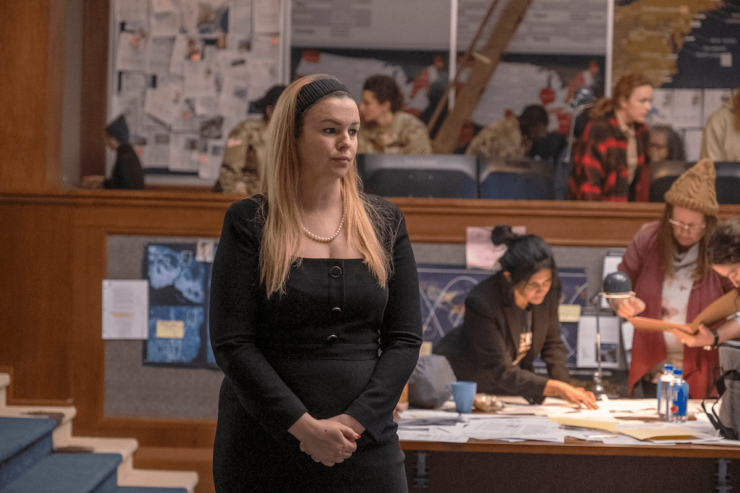
These first three episodes have clearly taken the Republican widows plotline as their foundation, and so far it works, even if the lead-up has been slower than I would find truly gripping. I was certainly wary of the new characters introduced via Kimberly and Nora; the latter so far seems like a nothin-muffin, though I also think the point is for viewers to underestimate her. Casting Marin Ireland means she’s going to give a hell of a performance, so I look forward to seeing Nora snap back at everyone who decided she didn’t have anything to contribute in the post-apocalypse. But Kimberly—oof. A clear avatar for Ivanka Trump, she is the former First Daughter entitled to the unconstitutional level of access her late father granted her in the White House, and the embodiment of the conservative values that Jennifer and her staff would deride: twisting “cancel culture” as an attack on boys like her own little hellions, openly saying that without men there is no future without any self-consciousness at how little she seems to value herself and other women.
But she’s also a grieving mother who in the blink of an eye lost basically lost all of the physical representations of this limiting identity she’s built for herself. It’s telling that, unlike Nora, we don’t see the moment where Kim discovers the bodies of her husband and three boys. I wonder if that’s being saved for a future episode, or if we simply didn’t need to see her lose everything. The parallelism in our introductions to both Nora and Kimberly is fascinating: We see each of them juggling personal lives with work, from Nora fielding calls about her son’s birthday party while managing POTUS’ press mentions, to Kimberly struggling into her shapewear while trying to corral her kids—while her husband just ignores them running around. It’s telling that both major Republican characters are portrayed as mothers trying to “have it all,” one of whom loses all of her children and the other loses a son but keeps a daughter.
What I didn’t anticipate would hit me so hard in the Y reread, and again with watching these first three episodes, was how much I would identify with these women—not politically, but in how they identify themselves with regard to the men in their lives. My father passed away suddenly in May; because of Covid, my only way to say goodbye was over Skype. In the months since, my mother, sister, and I have become like the women in this series: already close, but suddenly banding together even more to ensure our continued survival. We went from being the Zutter family to the Zutter girls… except that in another few months, there will be another boy. The same day my dad died, I was transferring a frozen XY embryo (though I didn’t know at the time) created from IVF. That life took, and now we girls are trying to get our heads around the idea of raising a boy when none of us have much of a clue how to do so. It’s funny that I speak in these terms, because I created the life with my husband, who will be an incredible role model for our son. But it’s difficult not to think of the men who I had assumed would be there—my father, my opa who died a few months later—whose lack of presence will be keenly felt. All of which is to say, rereading the comic and watching the series, which both use the death of sons to demonstrate the loss of innocence, hits differently now.
Depicting how this plague, like our own, splits the country down the middle is a canny way to draw in new viewers, but it may also simply be too much for people still living in the middle of the Covid pandemic. Regardless, I see why the showrunners elected for this political binary to take the place of the gender binary that characterized the comic in the early 2000s.
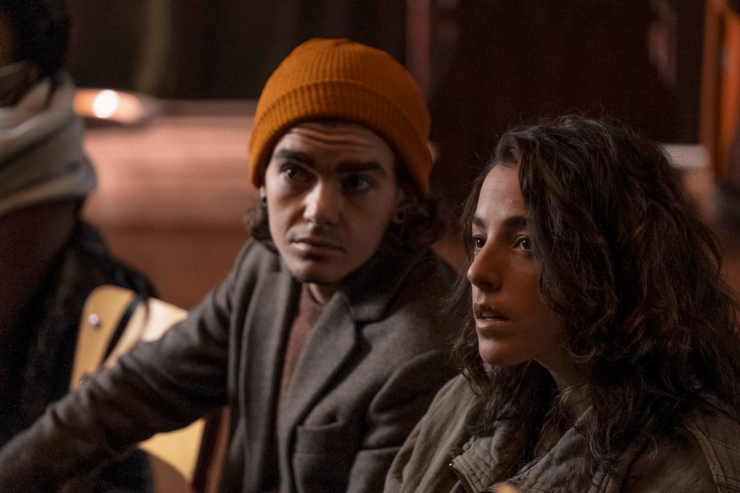
The gender commentary is limited in the first three episodes, but it’s deliberately established: When a desperate Yorick says that they must have found other surviving men, Jennifer immediately responds, “We’ve found plenty of men—none with a Y chromosome.” Sam gets nearly as much screen time as Hero, appended as he is to her story as a new character. But his struggles are not hers: “Do you have any idea what it’s like for me out there?” he challenges her, who has been acting in her own self-interest since she accidentally killed Mike. “The questions I have to answer, the shit I have to explain all over again.” Presumably future episodes will delve more into this—how in the early days, when people are looking for proof that cis men survived (as reassurance that perhaps their partners/fathers/brothers might have made it, too), Sam will be forced to defend his gender over and over. But I’m also curious to see the series engage with Sam and other trans characters as not just the only men left behind, but the only men who exist going forward. As staff writer Charlie Jane Anders explained in a recent newsletter about her work on the series, this is a world “where masculinity is being both fetishized and reinvented now that almost all of the cis men are gone.”
Both in its opening shots and the bloody XY montage at the end, the pilot bids farewell to (almost) every single cis man on the planet. What’s notable is that it’s not until the second episode that we get acknowledgment of the trans women who have also died in the Event. My assumption is that the writers’ room might have considered this too traumatic to show on-screen; an unfathomable number of trans women are killed every day in our world, so to replicate that on a dystopian series seems cruel and unnecessary. Still, Sam and Hero’s friends have built a little altar to their friends who were lost too soon: flowers, candles, photos, messages (Teacher, Sister, Friend… Scorpio; miss you every day), dreamcatchers. It feels like an appropriate tribute, though I hope we get more of the trans men than just these few scenes.
The series doesn’t seem entirely sure what to do with Yorick Brown himself. Though this Yorick is still one of the few characters to crack jokes about the post-apocalypse, he doesn’t possess much of his predecessor’s snark and would be better described as a soft boy. This was jarring on first watch but makes a lot more sense on rewatch; I especially appreciated that the writers gave him panic attacks, as a very external manifestation of his obvious existential crisis. From his begging Beth for guidance after his poor attempt at a proposal turned into a potential breakup (“What am I supposed to do here? Am I supposed to chase after you?”) to him sobbing naked in front of the mother and daughters at the dry cleaners, it’s clear that Yorick has never been challenged to take agency of his life. Even the aging-up (from 22 to 27) makes sense: Twenty years ago, Yorick being one year out of undergrad was an acceptable excuse for why he still hadn’t gotten his shit together; now, seeing a Millennial solidly in his quarter-life crisis is a familiar and even sympathetic sight.
But we’ll need more action from Yorick to be compelled to follow him on his journey, and not just because 355 is being awesome dragging his ass around the country. The comic mined five years from Yorick’s (mostly) unfailing devotion to finding Beth, even if their engagement was something of a question mark. Because the series starts with them fighting and clearly wanting different things, it makes the relationship less of an ideal for him to pin his hopes to and more of an afterthought to the quest to find Dr. Mann.
It’s frustrating that Allison Mann doesn’t show up at all, beyond the mentions of her, in the first three episodes. Even though it also takes until the end of the first trade paperback for Yorick and 355 to find her, she is an indispensable part of their core trio. Here, waiting to show her until episode four or later puts her at a narrative disadvantage, unless she makes up for the lost time once we meet her.
If anything, the Brown sibling I am much more fascinated by is Hero. I immediately love her and Yorick’s dynamic, which is good because (assuming we follow the comic’s arc) they’re going to become actual enemies instead of just bickering siblings. Easily the biggest change in the adaptation was Hero accidentally killing Mike the night before the Event—what a choice! This cements her spiraling behavior and sets her up as a truly self-destructive character… except that it squanders the opportunity for any real tension. I had assumed that Hero would be arrested by the police officer, watching a murder investigation and utter failure in her family’s eyes unspool in front of her—and then, instead, she would get a bizarre second chance as every cis man who could ruin her life would drop dead in front of her. Talk about plausible deniability. Instead, only the viewers know what she did, which is perhaps meant to set up the darkness inside her, but all in all it’s just an odd choice.
What really struck me about Hero’s encounter with Mike’s widow at the shelter is that it doesn’t devolve into “you homewrecker whore!” Instead, the wife simply takes the license from her husband’s mistress, smiles sadly, and says, “I wasn’t crazy.” She knew her husband was having an affair, but judging from the little we saw of Mike and how he gaslit Hero, he had no problem doing the same to his wife. I appreciated that in the post-apocalypse, it’s not about two women competing over a man who was going to die anyway; the more important thing is getting closure so she can move forward with her daughter.
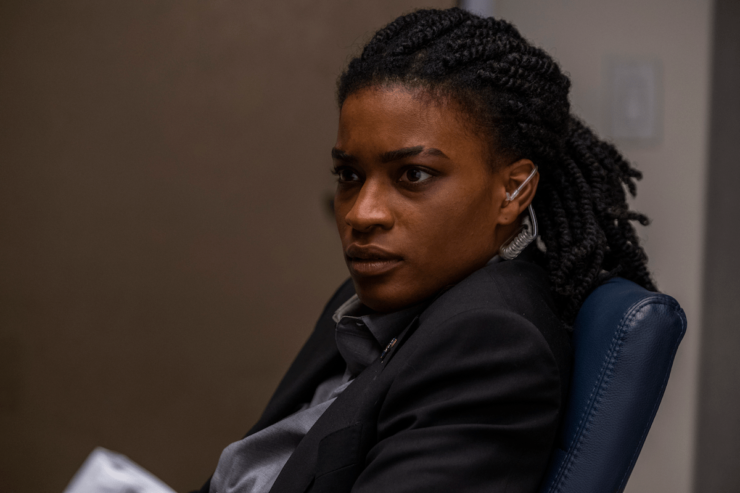
But by and far the best performance of the series is Ashley Romans as Agent 355. I admit, I was clinging to the old casting of Lashana Lynch, but Romans brings a vivacity to the character that I wasn’t expecting. Instead of coming across all dour, secret-society, need-to-know-basis, this 355 is barely keeping her shit together yet still manages to do the job. She’s much more of a chameleon—not just with her range of undercover personas, but even code-switching from room to room and face to face in the Pentagon. She knows how to play people, but she also will do whatever it takes to complete the mission. Moreso than what caused the Event, she’s the mystery to be unraveled as the series goes on.
At MailboxFox, 355 recovers an intriguing box of personal effects: her knitting needles (!!) and some yarn, a flower (dandelion?) paperweight, what I’m assuming is a beloved childhood necklace with perhaps a bird or flower on it, and an envelope that says “NOT YET!” Clearly, she decides not yet is now and opens it up to reveal an address in Winthrop, Massachusetts—some MacGuffin assignment from 1033? These are fun clues both to 355’s past and to the next step in her work, if we can even call it that by now when the Culper Ring seems irreparably broken.
Because uhh who else thinks that 355 took down that other helicopter?? The comic tried to introduce the idea that 355 and the Culper Ring were doing something nefarious, but it was clear that it was Jennifer Brown and Alter Tse’elon’s unfounded suspicions or manipulations. But by ending episode three on this ominous note, the series is smartly playing into conspiracy theories for the viewers who can see beyond the Democrats’ and Republicans’ squabble over the seat of power. After all, even the most clear-eyed of us can’t help but wonder if something larger is going on right above our heads.
Showrunner Eliza Clark has said that she has a five-season plan for the series, which would (perhaps unintentionally) mirror the lifespan of the comic as well; but by starting tight and presumably expanding the scope, it will be a very different approach to telling the story of the last men.
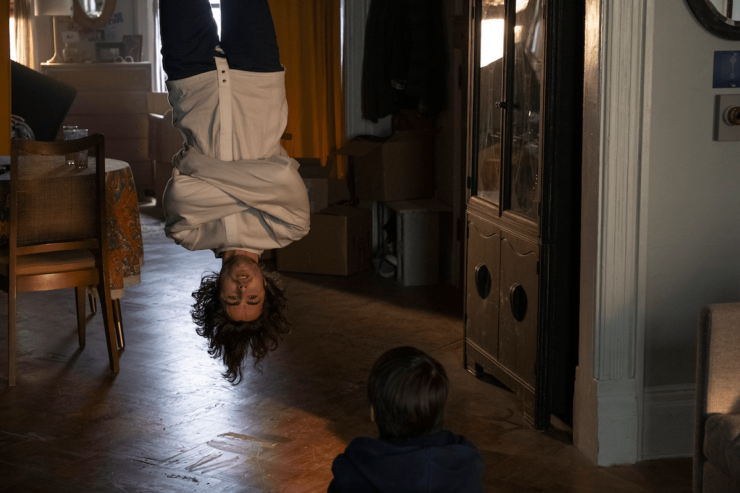
XYZ
- The opening credits feel very Orphan Black, but also like they could have done a lot more with the mirror imagery and riffing on XX/XY motifs. Except for the drowning straitjacket, that gives me a very Now You See Me vibe (and that’s a compliment).
- Yorick spray-painting “I’M ALIVE” messages to Beth in the pilot seems like a cute nod to Will Forte’s sitcom Last Man on Earth, which engaged in very different thought experiments from a similar premise: Forte’s initially-unsympathetic protagonist Phil “Tandy” Miller spends his first few weeks after the plague doing exactly this, driving around the United States spray-painting “ALIVE IN TUCSON” on every available surface—which both helps and hinders him in his future adventures.
- There appears to be a sly little Easter egg in the start of “Would the World Be Kind”: When 355 searches through MailboxFox, the computer screensaver resembles the FOXDIE virus from Metal Gear Solid.
- I’m calling it now, Hero is gonna be pregnant by the end of this season. Even though the comic’s big dilemma was about whether Yorick would father the next generation of the human race, television has trained me to be unable to see a pre-apocalyptic sexual encounter as anything but a Chekhov’s sperm situation. (Who knows if there were condoms stashed in that ambulance!)
- 355’s delivery of “you’re named after a dead clown” is note-perfect.
- For some reason, can’t stop giggling at the absurd detail of Regina Oliver having one red press-on nail left on her middle finger in the field hospital. But then again, taken alongside Jennifer Brown’s immediate fixation on her aide’s chipped polish, and Kim’s own neglected manicure when she can’t zip up her dress, emphasizes how for many women, their nails are a way of signaling to the world that they have their shit together, even despite all evidence to the contrary. I’ll be curious to see if future episodes return to this symbolism.
- Jennifer: “You don’t like theater.” Kim: “Eh. I like Phantom.” Wow.
- The writers’ room boasts Tor Books author Charlie Jane Anders, plus playwrights Donnetta Lavinia Grays and Catya McMullen; the first season is all female directors. Even if I wasn’t blown away by the first few episodes, I’m really excited to see more from this creative team.
So—a slow start gives way to an intriguing final beat! What did you think of the first three episodes of Y: The Last Man? Can the remaining seven pick up the pace in order to make it an appropriately post-apocalyptic story?
Natalie Zutter still can’t believe the Y adaptation is finally here. Join her in watching here and on Twitter!










